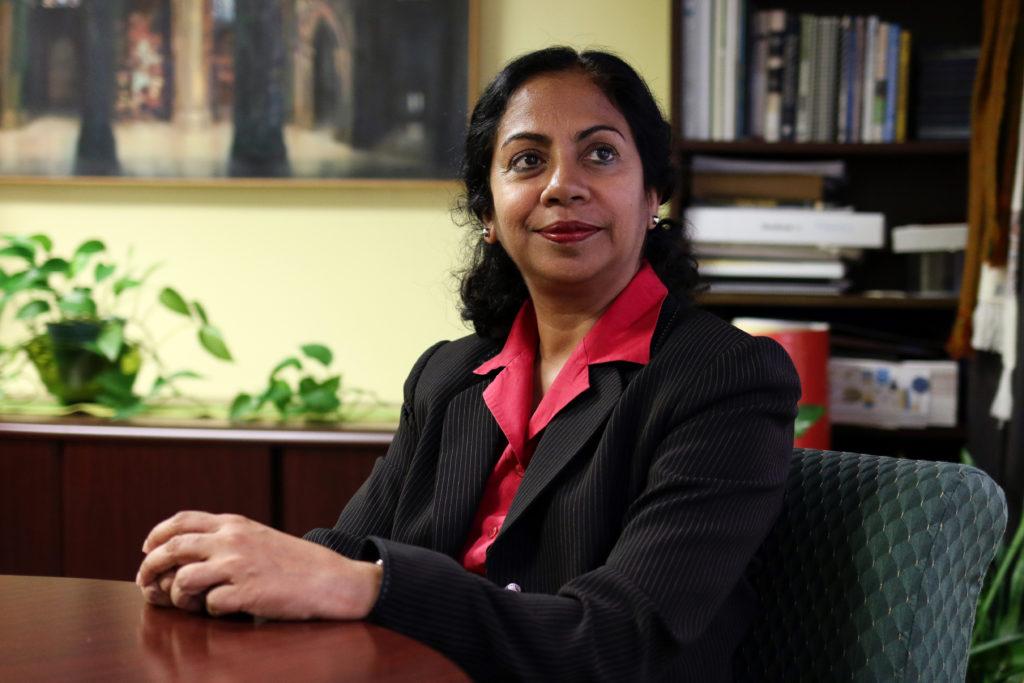The incoming leader of the Mount Vernon Campus’ academic programs said she will define her new role by fostering community between students and faculty in initiatives like the University Honors and Women’s Leadership programs.
After serving in various leadership roles at the University for more than two decades, Elizabeth Chacko will begin serving as the first-ever associate provost for special programs and the Mount Vernon academic experience on July 1. Chacko said she aims to transform the Vern into a space where cooperation and collaboration on “academic and creative projects is encouraged and valued.”
“I hope to help build community by engaging all residents of the MVC through events and activities that will be accessible to all,” she said in an email.
Chacko said in her first year as associate provost, she will spend time “observing and assessing” the Vern’s existing academic programs to “take stock of what is being done well and what could be improved” before she changes any projects or creates new ones.
“I will then be in a better position to start new initiatives that are well-received if I take time during the first year to listen and learn from students and faculty on MVC,” she said.
Chacko said she looks forward to working with the “academically gifted students” in the Vern’s academic groups, like the University Honors and Women’s Leadership programs. She said she also hopes to encourage Vern residents to pursue research early in their academic careers.
The incoming associate provost has served as the associate dean for undergraduate studies at the Columbian College of Arts and Sciences since 2015 and served as chair of the geography department from 2009 to 2015.
The provost’s office launched a search for the position last semester to improve programming on the Mount Vernon Campus. In her new role, Chacko will oversee multiple communities housed on the Vern, like the University Writing and Politics and Values programs.
She said she will work with faculty and students in the programs to help foster “an academic experience that has intellectual rigor but also underscores experiential learning through stimulating projects.” She will oversee the rollout of the new Mount Vernon Society of Fellows, a program that allows postdoctoral students to teach seminars on campus in two-year terms.
Chacko will also be involved in the search for a new director of the honors program after Maria Frawley, the longtime head of the project, stepped down at the end of last semester.
Ingrid Creppell, the interim executive director of the honors program, said she hopes Chacko will speak to potential donors to encourage them to fund honors program events on the Vern and support hiring more faculty for the program.
“It’ll be exciting to have her bring her own experience and her own ideas to a position overseeing the program,” Creppell said.
She said Chacko will head administrative tasks, like hiring more faculty, choosing faculty from different departments to teach honors courses and managing the program’s budget.
“She is a very creative person, so I think she’s going to be able to put her stamp on it,” she said.
Mark Ralkowski, an associate professor of philosophy and an associate professor in the honors program, said he hopes Chacko will work to change student sentiment that the Vern is only a place for students to live and work, rather than a place to have fun. He said creating an academic leadership position for the Vern will unify the campus and increase student engagement.
“I think this campus is full of faculty and staff and graduate students and undergrads who are invested in making the place as good as it can be,” Ralkowski said.
David Rain, an associate professor of geography and international affairs who teaches classes on the Vern, said Chacko can help foster a community on the campus by holding more interactive events that encourage communication between students, like inviting speakers to the campus and holding meet-and-greet sessions with authors.
“An academic community thrives when there is dialogue and interaction,” he said. “She knows this and can direct resources to foster the right conditions for growth.”





